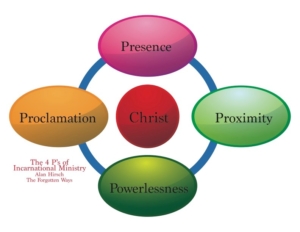By Phil Maynard
February 3, 2017
I have been a fan of Alan Hirsch since early in his work with the missional movement in America. In his book, The Forgotten Ways, Alan describes the 4 P’s of Incarnational Ministry: presence, proximity, powerlessness, and proclamation. I think this is a terrific insight for both the missional movement and for pastors/congregations seeking to share the life-transforming power of the gospel message. A visual illustration of the flow looks like this:
Presence is actually being in the same place, geographical connectedness. It sort of goes without saying that to be incarnational you actually have to be present, but we are naturally present many places during the day without thinking of it much one way or the other.
Proximity is deeper than just being present. It is about involvement. Proximity is about making ourselves available to someone, being willing to engage them at a deeper level. It is presence with purpose, presence with intentionality.
Powerlessness is a reminder that anything powerful that happens is because of the work God is doing. This is not something we make happen. It is the Holy Spirit at work that brings us to redemption and new life, and enables us to meet the needs of others with compassion and empathy.
Proclamation: It is only when the first three conditions of incarnational ministry are met (Presence, Proximity, and Powerlessness) that the proclamation of the gospel can be received.
Typically, we use this paradigm to discuss the ways in which we can connect with people beyond the walls of our local church. This is how people’s lives are transformed over time in the ‘mission fields’ of our neighborhoods and communities.
But what if this same process, described so eloquently by Hirsch, is also the path to connecting with the people who choose to enter within our walls? The same relational components must be at work even in our interactions with those who sample our congregational communities, those who are regular participants in worship, and especially those who are guests or newcomers.
Curious people make the choice to join us in our worship homes for lots of different reasons: because they’ve received a personal invitation, or because they’ve been dazzled by our great marketing or snazzy web site, or because they’ve heard about our reputation in the community. Whatever the reason they make that initial decision, it is what happens after they show up that determines whether they get connected and whether they will be able to receive the message God has for them. Just getting people into our worship space (presence) is not enough. We must be willing to engage them. We must make ourselves available to them. We must be willing to involve them (proximity).
Most congregations put a great deal of time and effort into preparing a worship experience where time and space are provided for the Holy Spirit to be at work. We spend hours and hours crafting every second of that experience. But no matter how good our music is or how strong our preaching is, people will not keep coming if they are not relationally engaged. The missing piece in many churches is good old-fashioned hospitality, where we practice Hirsch’s concept of proximity. Even in a congregation with strong, creative, scripturally authentic worship, people are left disconnected without that practice of proximity, because the old adage still rings true: “People don’t care how much you know until they know how much you care.”
So, call it proximity or call it old-school hospitality, here are some practical tips about how to make it happen:
- Train your congregation to engage people they don’t know in conversation. Invite them to make a new friend. If they don’t know how to start a conversation with someone they don’t know, teach them how.
- Provide a hospitality center with refreshments where people can gather for conversation. Its easier to talk with a drink in your hand (hence the attraction of cocktail parties). Coffee and juice work just fine.
- Have members invite newcomers to lunch following worship. The focus should be on getting to know each other—not on selling the church.
- Create a system for following up with first and second time guests. At minimum, send a letter or make a call thanking them for joining you in worship. Even better, deliver a welcome gift. Do something!
Without the proximity piece, people are left adrift and uncertain. With it, they are empowered to fully embrace their newfound faith family and partner in ministry together.
For lots of great insights into strengthening your hospitality system,
check out Phil’s book,
Shift: Helping Congregations Back into the Game of Effective Ministry,
available at www.emc3coaching.com/store,
along with other great leadership resources.








Leave A Comment